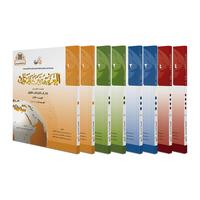٣،٩،٦٠ - المساواة الحقة - من صور العدل في الإسلام
Equality|true equality|of|aspects|Justice|the|Islam
٣،٩،٦٠ - المساواة الحقة - من صور العدل في الإسلام
3,9,60 – Wahre Gleichheit – eine der Formen der Gerechtigkeit im Islam
3, 9, 60 - True Equality - A Form of Justice in Islam
3,9,60 - La verdadera igualdad - una de las formas de justicia en el Islam
3,9,60 - La véritable égalité - est l'une des formes de justice dans l'Islam
3,9,60 - La vera uguaglianza - è una delle forme di giustizia nell'Islam
3,9,60 - Ware gelijkheid – een van de vormen van rechtvaardigheid in de islam
3,9,60 - Истинное равенство - одна из форм справедливости в Исламе
3,9,60 - Sann jämlikhet - en av formerna för rättvisa i islam
3,9,60 - Gerçek eşitlik - İslam'daki adalet biçimlerinden biridir
بينما كان أمير المؤمنين عمر بن الخطاب في مجلسه، وقف رجل من أهل مصر قائلا: يا أمير المؤمنين، جئتك من مصر: أطلب عدلك .
||||||||||||||||||Ich kam||||
"While"|was|Commander|the believers|Omar|Ibn|Al-Khattab||his council session|stood up|a man|the|the people of||saying||O Commander|O Commander of the Faithful|"I came"||Egypt|I seek|your justice
||||||||su asamblea||||||||||he venido||||tu justicia
Während der Befehlshaber der Gläubigen, Omar Ibn Al-Khattab, in seinem Rat war, stand ein Mann aus dem ägyptischen Volk auf und sagte: O Befehlshaber der Gläubigen, ich bin aus Ägypten zu dir gekommen. Ich bitte um deine Gerechtigkeit.
While the Commander of the Faithful, Umar ibn al-Khattab, was in his assembly, a man from Egypt stood up and said: O Commander of the Faithful, I have come to you from Egypt: I seek your justice.
قال عمر : أهلا ومرحبا. ما أمرك؟
|||und willkommen||
||Hello|and welcome||brings you
|||y bienvenido||
Omar sagte: Hallo und willkommen. Was ist los?
Umar said: Welcome and glad tidings. What is your affair?
قال المصري : سابقت ابن الأمير عمرو بن العاص، فلما سبقته، ضربني بسوطه، قائلا: خذها وأنا ابن الأكرمين.
||||||||||schlug mich|mit seiner Peitsche|||||der Ehrenwerten
said|the Egyptian|raced|son of|the prince|Amr|||when|I beat him|hit me|with his whip|saying|"Take this"|I am|son of|the most generous
||corrí contra||||||||me golpeó|con su látigo||tómala|||los más generosos
Der Ägypter sagte: Ich habe den Sohn des Prinzen Amr ibn al-As überholt, und als ich ihn überholte, schlug er mich mit seinem Stock und sagte: Nimm dies, und ich bin der Sohn der Edlen.
Al-Masri said: I raced the son of the emir Amr ibn al-Aas, and when I preceded him, he hit me with his whip, saying: Take it, and I am the son of the nobles.
أرسل عمر بن الخطاب رسالة إلى عمرو بن العاص، قائلا فيها : إذا أتاك كتابي هذا، فاشهد موسم الحج أنت وابنك .
||||||||||||erreicht dich|||||||
sent|Omar||Al-Khattab|letter||Amr|||saying|in it|when|"reaches you"|my letter|this|"attend"|the pilgrimage||you|you and your son
||||||||||||te llegue|||asiste al|la temporada|||tú y tu hijo
Omar ibn al-Khattab schickte einen Brief an Amr ibn al-As, in dem er sagte: Wenn dir mein Brief erreicht, dann bezeuge die Hajj-Saison du und dein Sohn.
Omar Ibn Al-Khattab sent a message to Amr Ibn Al-Aas, saying: If this book of mine comes to you, witness the Hajj season with you and your son.
ثم قال للمصري : أقم معنا بالمدينة حتى يأتي عمرو وابنه في موسم الحق.
||||||||||||der Pilgerfahrt
|he said|to the Egyptian|Stay|with us|in the city|until|comes||||season of truth|
|||quédate|||||||||
Dann sagte er zum Ägypter: Bleib bei uns in der Stadt, bis Amr und sein Sohn zur Zeit des Pilgerfestes kommen.
Then he said to the Egyptian: Stay with us in Medina until Amr and his son come in the right season.
بعد الحج زار عمرو بن العاص وابنه عمر بن الخطاب وكان معه فى المجلس المصري.
||visited|Amr||Al-Aas|and his son|Omar||||with him|in the||Egyptian council
Nach der Pilgerfahrt besuchten Amr ibn al-As und sein Sohn Umar ibn al-Khattab und der Ägypter war bei ihnen im Rat.
After the pilgrimage, he visited Amr ibn al-Aas and his son Omar ibn al-Khattab, and he was with him in the Egyptian council.
سأل عمر ابن عمرو بن العاص: لماذا ضربت هذا الرجل ؟ لم يجب ابن عمرو، فرمى عمر بالسوط إلى المصري، وقال له : اضرب ابن الأكرمين، فأخذ السوط وضرب ابن الأكرمين.
||||||||||||||warf zu.||||||||||||||
|Omar||Amr|son of|Al-Aas|why|hit||||he answered|son|Amr's son|then threw|Omar|with the whip|the Egyptian|the Egyptian||to him|hit|son of|the noble ones|he took|the whip|hit||the honorable
|||||||golpeaste|||||||entonces lanzó||con el látigo|||||golpea||||el látigo|golpeó||
Umar fragte Amr ibn al-As' Sohn: Warum hast du diesen Mann geschlagen? Amr's Sohn antwortete nicht, also warf Umar die Peitsche zum Ägypter und sagte zu ihm: Schlage den Sohn der Edlen. Der Ägypter nahm die Peitsche und schlug den Sohn der Edlen.
Omar Ibn Amr Ibn Al-Aas asked: Why did you hit this man? Ibn Amr did not answer, so Omar threw the whip to the Egyptian, and said to him: Hit the son of the hosts, so he took the whip and hit the son of the hosts.
بعد أن أخذ المصري حقه، قال له عمر: والآن اضرب عمرو بن العاص، فقال له المصري: لقد ضربت من ضربني، ثم التفت عمر إلى عمرو، وقال له : متى استعبدتم الناس وقد ولدتهم أمهاتهم أحرارا ؟!
after||the Egyptian took|the Egyptian|his right||to him|Omar|And now|strike|Amr||Amr ibn al-As|he said||the Egyptian|I have|I struck|"who"|"hit me"|then|turned|Omar||Amr|said||"When"|enslaved||and|gave birth to|their mothers|"as free people"
بعد أن أخذ المصري حقه، قال له عمر: والآن اضرب عمرو بن العاص، فقال له المصري: لقد ضربت من ضربني، ثم التفت عمر إلى عمرو، وقال له : متى استعبدتم الناس وقد ولدتهم أمهاتهم أحرارا ؟!
Nachdem der Ägypter sein Recht erhalten hatte, sagte Umar zu ihm: "Jetzt schlage Amr ibn al-As." Der Ägypter antwortete ihm: "Du hast bereits genug geschlagen." Dann wandte sich Umar an Amr und fragte ihn: "Seit wann versklavt ihr die Menschen, obwohl sie als freie Menschen geboren wurden?"
After the Egyptian took his right, Umar said to him: Now strike Amr ibn al-Aas. Al-Masry said to him: I beat the one who hit me. Then Umar turned to Amr and said to him: When did you enslave people when their mothers gave birth to them free?!
Mısırlı sağını aldıktan sonra Ömer ona: Şimdi Amr b. el-Aas'ı vur dedi.El-Masri ona dedi ki:Bana vuranı ben dövdüm.Sonra Ömer Amr'a döndü ve ona:Sen ne zaman insanları köleleştirdin? anneleri onları özgür doğurduğunda?!

